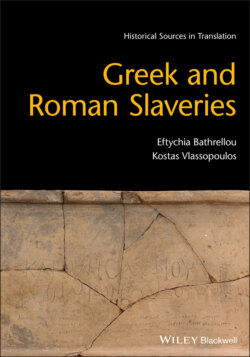Читать книгу Greek and Roman Slaveries - Eftychia Bathrellou - Страница 32
1.21 Galen, The Doctrines of Hippocrates and Plato (De placitis Hippocratis et Platonis), V.7.64–66, pp. 352,20–354,2 De Lacy24 (V.497–98 Kühn): Greek Medical Treatise (Late Second/Early Third Century CE)
ОглавлениеGalen is here commenting on Plato, Republic, 440c1–d3, which illustrates via an example that the spirited part of the soul is an ally of the rational part of the soul. The Platonic example consists of the opposing reactions of two men to harsh treatment: one of them believes that he is in the wrong, while the other believes that he is being wronged.
Literature: Schlange-Schöningen 2003: 255–90, 2006.
The man who thinks that he is suffering justly, because he himself committed some wrong first, endures his punishment all the more nobly the nobler he is by nature. The other man, who thinks that he is being wronged, gets angry, rages and fights on the side of what seems to him to be just. We can observe these things happening every day among our slaves, too. Those who are caught thieving or doing things of that sort do not get angry when they are being whipped or starved or dishonored by their masters. But those who think that they suffer, or have suffered, such punishments wrongly, their spirit always turns savage inside them and craves vengeance on the one who is wronging them.
Which forms of punishment for slaves are presented in the passage?
What criterion determines whether slaves accept punishment or not, according to Galen? Do you believe Galen?
How might the principle of just punishment have affected the unilateral right of masters to punish their slaves?
